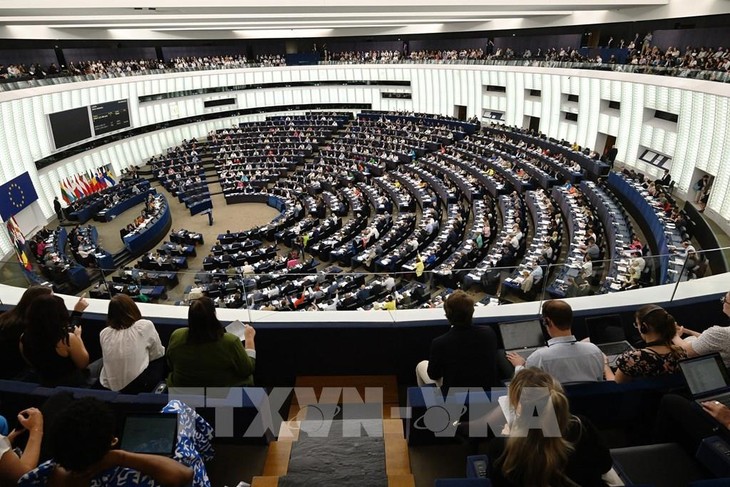(VOVWORLD) - The new leadership of the European Union officially began its new term on December 1. Observers said that in the next 5 years, the bloc's new leaders will have to handle the biggest security, political, and economic challenges since the EU’s inception.
 The European Parliament meeting on Novermber 27, 2024 (Illustrative photo: VNA/ AFP) The European Parliament meeting on Novermber 27, 2024 (Illustrative photo: VNA/ AFP) |
The European Parliament on November 27 approved the nominations of President of the European Commission Ursula von der Leyen, President of the European Council Antonio Costa, and High Representative for Foreign Affairs and Security Policy of the EU Kaja Kallas.
A difficult problem
On December 1, the first day of their term, Antonio Costa and Kaja Kallas traveled to Kiev for talks with Ukrainian President Volodymyr Zelenskyy. The two new EU leaders said their trip demonstrated the EU's support for Ukraine in a conflict that has lasted more than 1,000 days and caused tremendous losses of lives, infrastructure, and economic strength. The trip suggested that the conflict will continue to dominate the policies of the EU and its members.
German Chancellor Olaf Scholz visited Kiev on Monday and pledged additional military aid to Ukraine worth nearly 700 million USD.
Observers said that, with Donald Trump winning the US Presidential election, the burden of the Ukrainian conflict may fall entirely on Europe. Trump has repeatedly said that he wants to immediately end the conflict in Ukraine, and asked Europe to take greater responsibility.
Leslie Vinjamuri, Director of the US and Americas program at the UK’s Chatham House Institute, said: "The existential concern for Europeans has been what happens to Ukraine, what happens to Europe's security, what happens to America's commitment to NATO. Ukraine is symbolic of whether or not America will come to the support in a meaningful and significant way. Will America be there for Europe when that happens?
The question for the EU is whether it has the political will and economic resources to take on the role of main backer for Ukraine. Observers say the selection of Kaja Kallas, a hardliner on Russia and an absolute supporter of Ukraine, as the High Representative for Foreign Affairs and Security Policy shows that the EU will not bow to pressure from Trump. Czech Foreign Minister Jan Lipavsky said that, even without pressure from Trump, it’s time for Europe to take on a bigger role.
“I think Europe should play a more robust role, even without Donald Trump making it so. We have to be ready for that. There might be scenarios where Ukraine will be more reliant on the European help,” said Lipavsky.
Europe first
Other concerns are the risk of economic lag and reduced competitiveness compared to the US and China. In a report on the future of European competition published in September, former President of the European Central Bank Mario Draghi warned that Europe is falling behind in the economic race with the US and China, especially in cutting-edge technology, and is at risk of becoming a loser in global economic competition. The report said Europe should implement a “Marshall Plan 2.0” and spend 800 billion euros a year on technology, energy, and defense.
President of the European Commission Ursula von der Leyen announced on November 27 the “Competitive Compass” strategy as focus of the EU’s new term. A working group was established to turn Mario Draghi’s report into specific EU policy proposals. Vice President of the European Commission and former French Foreign Minister Stephane Sejourne said the new “Europe First” policy will help the EU counterbalance Trump’s “America First” policy and China’s trade superiority.
Dealing with the challenges posed by a new Trump administration will not be easy. Top European officials are extremely concerned that Trump will use tariffs as a threat to gain trade advantages over allies, such as the threat to impose 25% tariffs on Mexico and Canada. The concern is well founded. During his first term, Trump imposed tariffs on aluminum and steel products imported from Europe.
European Commissioner for Economy Paolo Gentiloni said: "Increased protectionism of US trade policy would be extremely harmful to both economies. The Commission will work with the incoming US administration to advance strong Atlantic agenda and ensure internaitonal trade chanels remain open, while making them more secured."
Instead of fear and apprehension, many European officials and EU members are now expressing a tougher stance on Trump. German Economy Minister Robert Habeck said the European market is very important to the US and the US needs to understand that. He called for Europe to act in a united manner if the US starts a trade war, warning that a timid approach to relations with the US will only harm Europe.